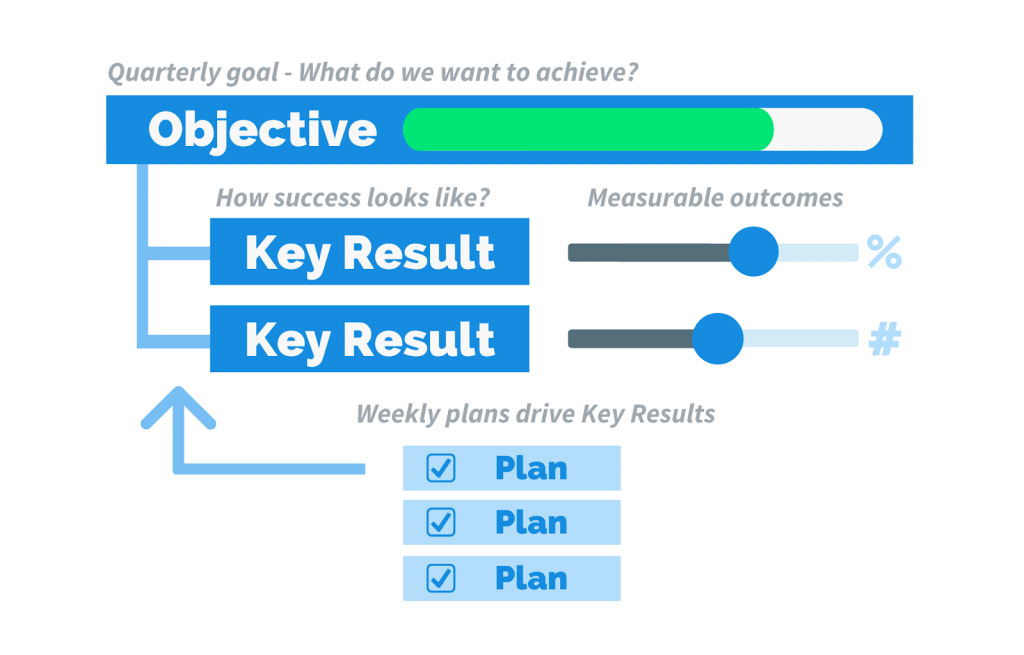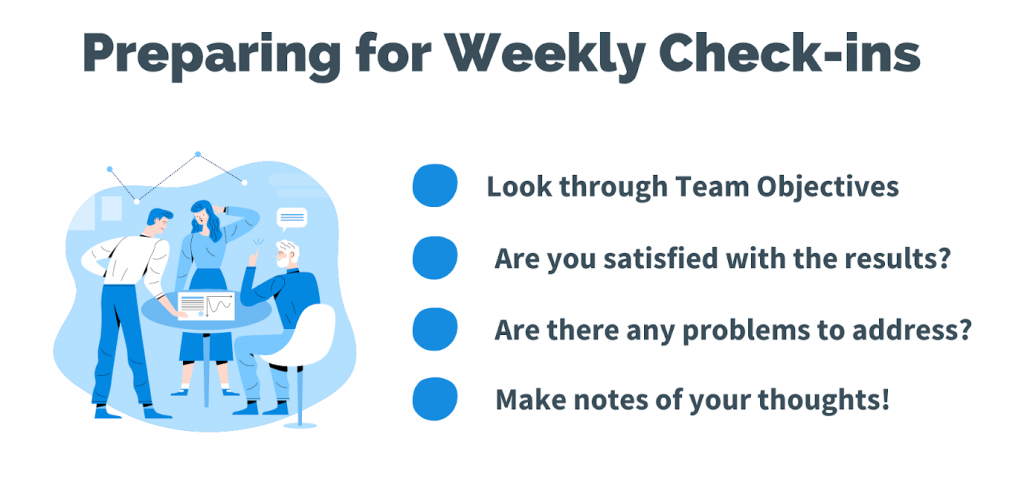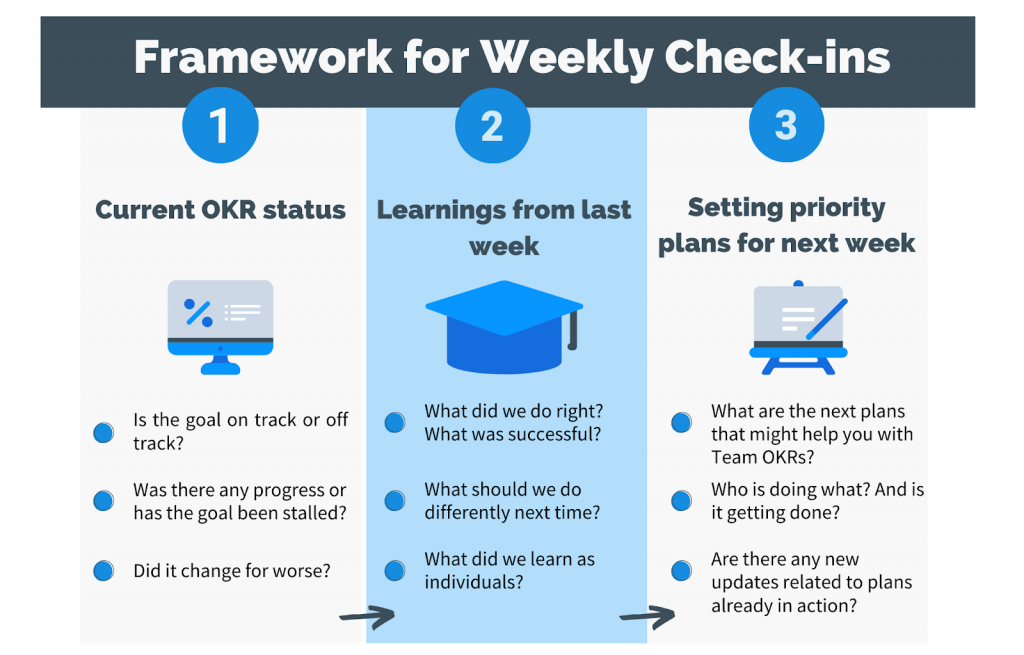To be successful with the OKR goal setting methodology, you need to actively work toward them, discuss them, check the progress and plan what ideas your team could execute. The best way to do all that is through a weekly team OKR check-in.

An OKR check-in is a quick 15-20 minute meeting where you and your team reflect on the progress of Team OKRs and set new priorities for the upcoming week.
The purpose of the OKR check-in is to facilitate OKR progress. Teams make sure that progress is happening by looking at accomplished plans, the results of these plans, and the lessons learned when moving forward. This turns your work towards achieving Objectives and Key Results into a weekly flow.
Weekly team OKR check-ins are crucial for a successful OKR cycle. Even if it seems obvious that goals won’t be achieved when there’s no one taking action, weekly check-ins are still incredibly important to keep everyone focused. Alignment, transparency, and progress aren’t just important when it comes to OKRs. They are also crucial when it comes to taking action towards goals. You can run weekly OKR check-ins as a part of your general weekly or bi-weekly team meetings.
Check-Ins with OKR Software 🎯
Use dedicated OKR Software to simplify check-ins. Color coded OKR tracking and visual dashboards give an immediate overview of company-wide progress.
How to Prepare
Before going into the meeting, take time to look through the Team Objectives and update any progress made on KRs. This is also the ideal time to note any additional insights. Are you satisfied with the results of your OKRs? What were your biggest priority plans from the previous week? Do you know how to progress from here? Are there any problems that you noticed and want to bring up? Do you have any suggestions you want to share with the team?

It’s good to take written notes or leave comments under the specific OKR so you can see what’s been happening over time. Because a KR’s progress meter can move back and forth, it’s also a good idea to document where progress stalls and not just which KRs advance. If you have any important ideas or questions about your team’s OKRs, it’s good to write them down in the comments as well so everyone can familiarize themselves with your concerns.
It’s important that your weekly OKR check-ins have the same framework each week so people can get used to the workflow and know what to expect. However, the specific questions in the meeting agenda will differ depending on how well everyone’s doing and which goals you need to focus on.
Best Practice Framework for OKR weekly check-ins:

- Current OKR status
- Is the goal on track or off track?
- Was there any progress or has the goal been stalled?
- Did it change for the worse?
- What did we learn from last week?
- What did we do right? What was successful?
- What should we do differently next time?
- What did we learn as individuals?
- Set new priority plans for next week
- What are the next plans that might help you with Team OKRs?
- Who is doing what? And is it getting done?
- Are there any new directions or updates related to plans already in action?
Check-Ins with OKR Software 🎯
Use dedicated OKR Software to simplify check-ins. Color coded OKR tracking and visual dashboards give an immediate overview of company-wide progress.
How to Facilitate
- Make sure that everyone is aware of the framework you’re using.
- Keep track of time so meetings don’t derail or go on too long.
- Moderate the meeting. When some discussions start to go off track or delve into too many specifics for the whole team, then ask the parties involved to schedule their own meeting to continue the discussion later.
- Make quick notes. Use these to write a summary after the meeting and make sure that any good ideas or lessons learned will not be immediately forgotten.
- Don’t do all the talking! Make sure that all the parties involved get to share their thoughts or ideas. They see things from a different angle and it can be very useful for planning ahead to make use of everyone’s varied experience.
- When setting new priorities for the upcoming week, encourage your team members to be creative and try new things.
- Pay attention if there are people in the team who seem to not be engaging with the OKRs even if they should be. Likewise, look out for people who may be struggling. If someone is having a hard time, have a friendly discussion with them afterwards to figure out what the cause may be.
How to Follow-Up
Don’t run the OKR check-in meeting just for the sake of having a meeting. There should always be an outcome for every meeting you have. It’s also important to remember what was discussed. Choose how you want to share and document the lessons learned and any new ideas that came up.
If you are using Weekdone to track your OKRs, you can, for example, add lessons learned or new ideas to the OKR comments or share them as a message on the team Newsfeed. New priorities set for the next week(s) should be added to the Plans of the responsible party. This way, these plans are not forgotten and everybody can keep track of the situation. During your next meeting, you should briefly go over this set of priorities. Make sure to discuss progress and the effect the completed plans had on your Objectives.
(If you aren’t using Weekdone yet, you can sign up for free! It’s forever free for teams of 3 or less, or if you have a larger team you can test it out with a 14-day trial.)
Check-Ins with OKR Software 🎯
Use dedicated OKR Software to simplify check-ins. Color coded OKR tracking and visual dashboards give an immediate overview of company-wide progress.
5 Most Frequently Asked Questions

Implementing OKRs requires a change in thinking and in management. It’s basically a new habit for the whole team or company. If a manager doesn’t show initiative and support, then employees will find it overwhelming and will stop using them. If a team manager doesn’t think it’s worth the effort, then why should the team? OKRs are all about execution. It’s an ongoing circle of setting plans, completing them to reach desired outcomes, reflecting and analyzing their impact, learning from mistakes or success, and setting new plans again. OKRs are a team effort. Therefore, they cannot succeed without a fixed process and ongoing discussions.
With weekly check-ins, you can also increase team motivation and engagement. The whole team gets a better overview of what everybody is doing, which helps everyone move in a unified direction.
It’s simple. If this conversation affects everybody in the team and it is valuable information, then yes. This is under the assumption that no one else has anywhere to be as well. But you still have to be careful not to derail the conversation. There should be an outcome for every meeting you have. Repeating or arguing over things that everybody already knows doesn’t help anyone besides those that want to hear their own voice. Also, most things can’t be solved by just discussing them. You need to try and gather feedback to see what works and what doesn’t.
If the conversation affects a part of the team, then they should continue the topic after the meeting. There’s no point in holding up other people who don’t need to be in that discussion. The more the meetings go over time, the more people start to feel that check-ins are not valuable. They are, but they need to be moderated carefully.
As a manager, you need to have the big picture of everything going on. However, your team members might know important details that you are not aware of as it is specific to their work or expertise. OKRs are all about little details that impact what works and what doesn’t. You need to hear different points of view and different experiences to make the system work and increase engagement and flow. Also, just cascading plans without any discussion can demotivate the team and that is definitely not what you would want.
To have great success and achieve ambitious goals – definitely not. As mentioned before, OKR check-ins are meant to reflect on what’s working and what’s not so you can set new plans to accomplish goals. If you have only one (or even three) meetings per quarter to do it, then you likely won’t have time to test how projects are going or check if people are working on the right things.
If the KR is not progressing, don’t immediately panic. The stagnant KR might not be the most important aspect of it. There are two questions you need to ask. First: did you learn something new? Second: was that information valuable? If you can answer ‘yes’ to these questions then the KR might have served its purpose without making any measurable progress. Maybe you picked a KR that is very hard to measure or maybe your KR doesn’t reflect the success of the Objective itself. Unless you didn’t learn any valuable lessons, you actually succeeded at something. As Thomas Edison said “I have not failed. I’ve just found 10,000 ways that won’t work.” Head to OKRexamples.co for some example OKRs if you feel you need a quick reminder.
The OKR check-in is a critical part of implementing the Objectives and Key Results methodology. It is important to have a structured way to run your check-ins and OKRs.
The best way to do that is with Weekdone. It puts the idea of weekly check-ins at its core and builds a culture around weekly updates and OKR tracking. It is the best way to successfully implement OKRs in your team.